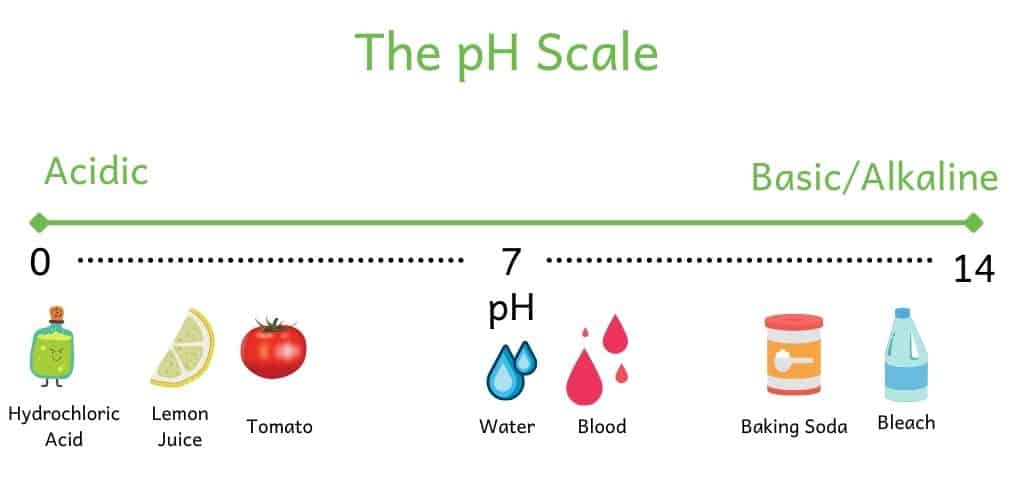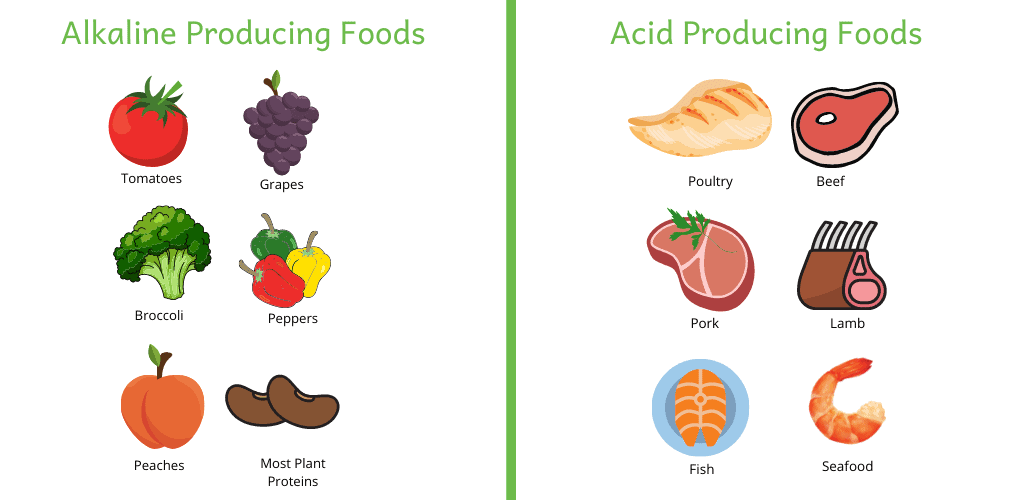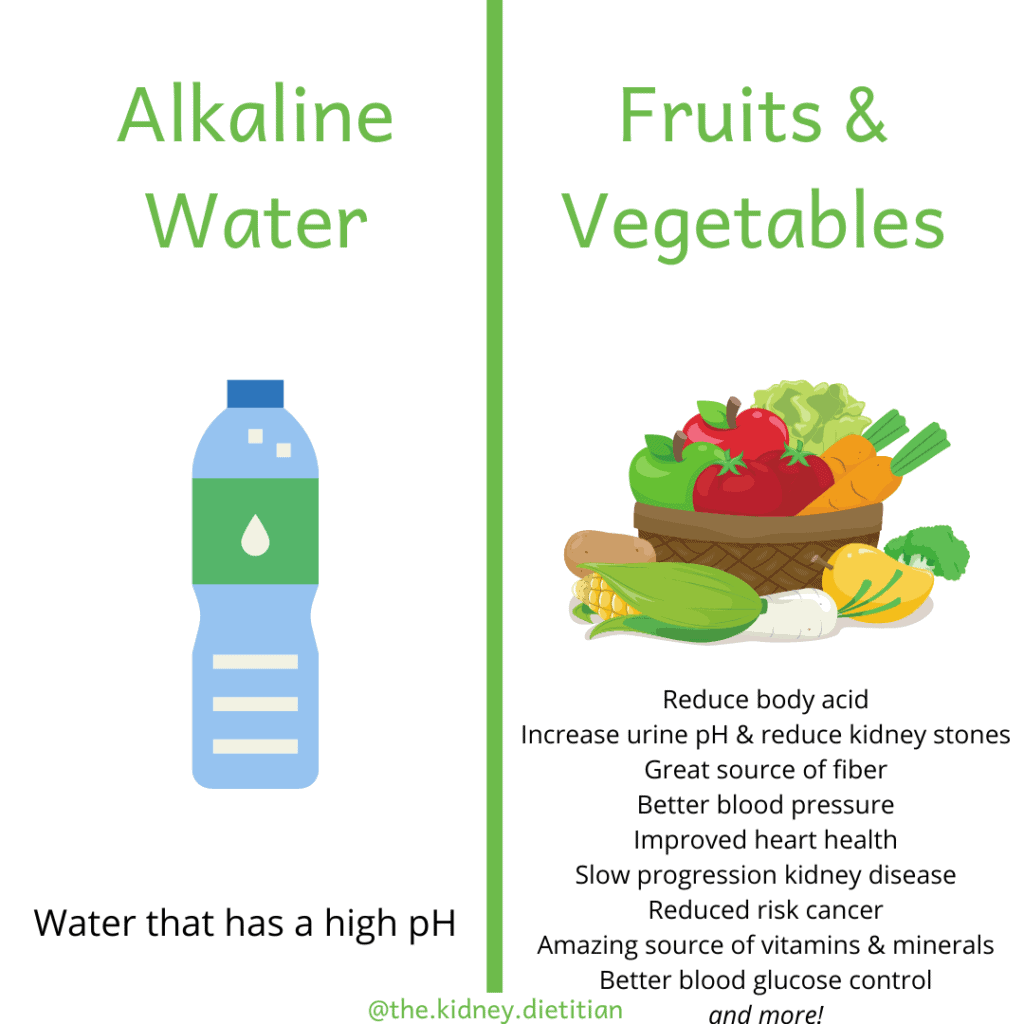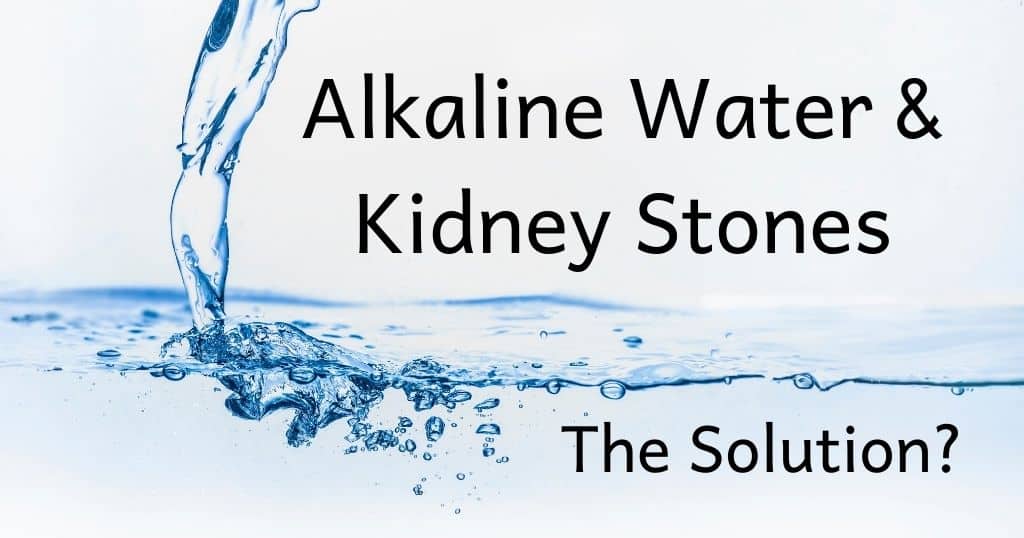In 2020, alkaline water was estimated to make $46 million in revenue, a 20% increase from 2019! (1) This is no surprise, as alkaline water carries many (largely false) health claims ranging from improving digestion, reducing cancer risk, anti-aging properties, immune boosting, colon cleaning and yes, the prevention of kidney stones.
Although alkalinity does play a role in kidney stones, alkaline water likely does not change the pH of your body in the way it needs to in order to reduce kidney stones. Read on to learn more about alkalinity, alkaline water & kidney stones!
*Please note that this post contains clearly identified affiliate links. As an Amazon affiliate, I may earn a small commission on qualifying purchases (at no extra cost to you).
Table of Contents
The Alkaline-Acidity Scale: pH
To fully understand the alkaline water & kidney stone connection, we have to take a trip back to high school chemistry class. I promise to make this as painless as possible!
Think of alkalinity and acid as a spectrum, measured by the pH scale that runs from 0 to 14. The more acidic a substance is, the lower the pH value. The more alkaline it is, the higher the pH.

What is Alkaline Water?
Alkaline water is just as it sounds: water that is more alkaline than “normal” drinking water. Most water has a pH of about 7, and is neutral in terms of acidity and alkalinity. Alkaline water has electrolytes added to it to alkalize it, and it has a pH higher than 7.
The exact pH of alkaline water varies drastically by brand. In general, the pH of alkaline water ranges from 8 to 10.
Alkaline Water & Body pH
Although alkaline water has a high pH itself, this does NOT necessarily mean that this alkalinity ends up in our body after digestion. Or, that alkaline water causes our urine to be more alkaline, which is most important for kidney stone prevention!
Your stomach contents have a pH of 1.5-3.5. Stomach acid will neutralize the alkalinity of alkaline water as soon as it hits your stomach. Therefore, alkaline water will likely not reduce acid levels in your blood, cells or organs.
Although alkaline water is alkaline itself, it DOES NOT necessarily reduce acid levels in your urine.
Benefits of Acid
If you drink a TON of alkaline water, it could raise your stomach pH – which can be dangerous. The acid in your stomach plays an important role in digestion and absorption of food and specific nutrients, especially vitamin B12 and protein.
Stomach acid also helps kill harmful bacteria that might be on your food. This helps keep us safe from foodborne illness.
pH & Health: Do We Need Alkaline Water?
The alkaline water industry consistently spreads a message that our bodies function better with less acid (or, more alkali), therefore acid should be feared. They use this message to sell alkaline water. This is simply not true.
Acidity and alkalinity do play an important role in health. Your body tightly regulates the pH of your blood. If your blood pH gets too high or too low, your body will not be able to function properly. In fact, if your body gets too alkaline, this could cause death.
Because pH is so important, your body has many ways to keep pH where it should be.
Kidneys: The Acid Balancing Powerhouse
Firstly, assuming you have working kidneys and lungs, your body is really good at keeping pH in the right range.
The biggest way your body keeps pH in the right range is via your urine. One of the main functions of your kidneys is to keep acid and alkaline levels where they should be. Kidneys do this by carefully getting rid of just the right amount of acid in your urine to keep your body’s pH at the right level.
If you have kidney disease, learn more about how nutrition can help keep acid levels in balance!
Here is where kidney stones come into the picture. If you eat a diet that produces a lot of acid, this acid ends up in your urine. High urine acid levels make uric acid, cystine and calcium oxalate kidney stones more likely. However, read on to learn more about how alkaline water probably won’t lower urine acid levels.
Alkaline & Kidney Stones
Is acid even a bad thing for kidney stones in the first place? It can be!
Too much acid in your urine (or, low urine pH), can make uric acid, calcium oxalate and cystine kidney stones more likely. (2) By far, calcium oxalate kidney stones are the most common type of kidney stone. (3) Uric acid kidney stones are common as well. If you have a history of these types of kidney stones, or have a low urine pH on a 24-hour urine test, there are things you can do to make your urine more alkaline.
However, too little acid (or, a high urine pH) makes calcium phosphate stones more likely to form. (2)
How To Alkalize Your Urine
When it comes to alkalizing your urine, we need to think about what pH the metabolism of a food makes, rather than what the pH is of the food itself is. Your stomach acid neutralizes the pH of anything you eat or drink. This is the crux of why alkaline water likely doesn’t actually alkalize your urine.
Foods That Make Alkaline
Unlike alkaline water, fruits and vegetables will actually impact body pH and health. Essentially, all fruits and vegetables make alkaline during metabolism. The alkali made during this process can help neutralize acid in your body, and reduce the amount of acid your kidneys have to get rid of in your urine. (4)
The difference between the pH of a food and the metabolism of that food is an important distinction. For example, tomatoes are acidic themselves. However, the metabolism of tomatoes makes alkali. So, tomatoes actually have an alkaline effect on your body, even though they are acidic themselves.
Essentially, the more fruits and veggies you eat, the more alkaline your urine will be! In many cases, especially for uric acid kidney stones, more alkaline urine is a good thing!
On the flip side, protein foods, especially animal flesh such as meat, poultry, fish and seafood, produce acid. Diets that are high in protein tend to increase urine acid levels. (4)

This concept plays out in research. We know that people who eat more fruits and vegetables tend to have a much lower risk of kidney stones. (5) (6) (7) This is likely at least partially due to the beneficial impact of fruits and vegetables on urine acid.
Does Alkaline Water Make Alkali?
How does alkaline water fit into this? Chances are, even though alkaline water is alkaline itself, the metabolism of it will not produce alkali. Therefore, it will have no benefits for kidney stones, above the benefit of drinking regular water.
For all brands of alkaline water I could find, there was not enough information about the amount and type of electrolytes in them to determine if they would make alkali during metabolism. As we know, the pH of an actual liquid (or food!) itself says nothing about it’s ability to produce alkali during metabolism.
If you need to alkalize your urine for kidney stones, you are much better off focusing on eating plenty of fruits and vegetables and eating the right amount of protein, rather than drinking alkaline water.
Medications
Medicine is another way to alkalize your urine. Potassium citrate and sodium bicarbonate are two common medications prescribed to reduce urine acid levels, and help prevent the most common types of kidney stones.
Potassium citrate may also be prescribed to increase urine citrate levels. Citrate makes it harder for calcium kidney stones to form.
Ask your doctor before taking any medications.
Alkalizing Water Enhancers
There are a few beverages that are specially formulated to produce alkaline. Unlike most alkaline waters on the market, we know exactly what is in these drinks, and that they have the right combination of nutrients to make alkali after your drink them.
These drinks are also a great source of citrate, which can help prevent calcium kidney stones. (8)
Two common beverages recommended for kidney stones are:
These drinks are not right for everyone. In some cases, these drinks could be harmful. So, make sure to ask your doctor or Registered Dietitian if these drinks are right for you!
The Best Water for Kidney Stones
No matter what kind of kidney stone you have, drinking enough water is one of the most important things you can do to prevent them.
The American Urological Association recommends drinking enough fluid to make 2 1/2 liters of urine each day. For most people, this means drinking about 3 liters of fluid. (9)
But, what kind of water is best for kidney stones?
Good Ol’ Tap Water & Kidney Stones
Truly, for most people, plain old tap water is the best water for kidney stones. It is cheap and accessible, making it more likely that you will be able to drink enough!
In rare cases, hard water may be a problem.
Bottled Water & Kidney Stones
Bottled water certainly isn’t necessary for people with kidney stones. But, if you prefer the taste of bottled water and it will help you drink more, then bottled water is a good choice for you!
Mineral Water & Kidney Stones
Mineral water can contain large amounts of calcium. Although eating enough calcium is important for calcium oxalate kidney stone prevention, it is ideal that calcium come from food.
One or two mineral waters a day will likely not cause issues. However, because people with kidney stones need to drink so much water, that extra calcium could add up to harmful amounts.
Ask your dietitian what is best for you!
Alkaline Water & Kidney Stones
Since we don’t know if alkaline water will actually reduce urine acid levels, I cannot recommend alkaline water above plain tap water.
There is also no research to show that alkaline water is good for kidney stones.
In addition, alkaline water can be very expensive. I’d save your money and use it to buy fresh fruits and vegetables!

Other Fluids For Kidney Stones
To prevent kidney stones, most of your fluid should be water. However, water can get boring!
Here are some other good fluid options to mix it up.
- Unsweetened sparkling water (like La Croix*, Polar* or Bubly*)
- Milk (calcium rich foods can help prevent oxalate kidney stones)
- Citrus Flavored Diet Soda
- Sugar-free lemonade*
- Tea & Coffee (Yes, tea! Studies show a reduced risk of kidney stones in tea drinkers) (4)
Be careful to limit drinks with lots of sugar in them like juice, punch, regular soda, energy drinks, or sweet tea. Sugary drinks can increase the risk of kidney stones.
How to Prevent Kidney Stones
There is NO single kidney stone diet. Nutrition for kidney stones should be personalized to the kind of kidney stone you have, and your 24-hour urine risk factors. (9)
If you are interested in learning what you can do to prevent kidney stones, check out my other resources for kidney stones:
- Other articles about kidney stones
- Read more about general nutrition advice for calcium oxalate or uric acid kidney stones.
- Kidney Stone Nutrition School
- Guide to personalized kidney stone nutrition
Happy Eating!
Melanie


I think that if you drink normal water, you’ll be okay. But sometimes people need the right ph level due to health concerns. I have gut issues and drinking alkaline water improves my digestive health. But yeah, sometimes kidney stones really depends on your lifestyle and food intake.
Hi, I have a RO + UV with alkalinizing water purifier. I tested the water pH level, it is 9.5. So that, is there create a kidney stones becouse of high pH in our water ? Please reply me.
That high pH water likely isn’t impacting your urine pH, as discussed in this article. Double check with your doctor to know what is best for you!
Thank you Melanie for your immediate reply. Have a Wonderful day.
Man I have been drinking ONLY ph Alkaline Water for 4 years and it got rid of ALL of my reflux, heartburn, gas , and misery. I lost weight too because I didn’t drink sugar drinks anymore. Then last year I got kidney stones , according to an ER Dr. I did not detect if they passed but I did take steps to dissolve them. I was supposed to follow up with a Urologist but I didn’t. Now a year later I have them again or at least the symptoms. The pain is horrible and I feel tired and feverish. I’m going to the Dr tomorrow. I just found when I Google “Does Alkaline Water cause kidney stones that a urologist says not to drink it because the found in rare cases it coincide in the development of stones !! So im confused because this article and other research says that magnesium and potassium citrate are sometimes prescribed for the dissolving of stones so these are the ingredients IN PH WATER. I’m so tired of trying to do right then being wrong. What these ignorant doctors don’t tell us is. I believe that it’s up to us as individuals to find our very own diet that works for our system.
Also if I’m not mistaken. I think there was a case where these people were drinking some type of water and they actually became poisoned and some died with the metals that were contaminated in the water and it may have been alkaline i’m not sure. Dr Eric Berg is good at researching the truth. check him out on YouTube.
Hi Patrick! I know all of this can be SO frustrating. I think the key is knowing that kidney stone prevention is COMPLETELY different for each person. And yes, something that could help one person could be harmful for another. It is SO important to make sure you are getting advice from someone who knows what they are talking about and the advice is relevant for YOU. This Dr. Eric Berg may be a good chiropractor, but I don’t see he has any training in nutrition.
Hi Melanie,
I am recently recovering from Lithotripsy on multiple kidney stones in both kidneys. They also had to place stents in as well and I finally had those removed. During this time I was able to do some research on kidney stone prevention, but my kidney function is also lower than expected as well. I am also type-2 Diabetic which makes all of this even harder to work around with every doctor telling me to try something different. They took me off of my Metformin to help protect my kidneys, so now I am solely relying on insulin and trulicity for blood sugar control until my kidney function improves. My weight-loss doctor said that I should do a high Alkaline diet and wanted me to start drinking Alkaline water. But I have been fine with drinking filtered tap water that is delivered through my fridge. They have me drinking 128 oz. per day to ensure that all of the kidney stone grit and dust is getting flushed out.
My stones were Calcium Oxylate stones. This is my fourth time having a Kidney stone attack, but the first time I had to have surgery to remove them because of their size. I am 48. I also don’t want to go too far on the Alkaline side and develop the other kind of stones either. I am just confused with all the diet information everyone keeps throwing at me, and that they tell me I shouldn’t eat, but then someone else tells me that, I shouldn’t be avoiding that food, I should be avoiding this. it has just been frustrating, and seems like all of my doctor’s are at different ends of the spectrum and they all work for the same medical group. Is there anyway you can help lead me down the right path? Any help would be appreciated! Thank you!
Best regards,
Sherman
Hi Sherman! Thank you for sharing so much about your history! I’d love to help you figure all of this out. I think you would be a wonderful candidate for Kidney Stone Nutrition School. I could help you see how all of these different recommendations actually fit together quite nicely (and, maybe help you understand which of these recommendations don’t make much sense!). The key to nutrition for kidney stone prevention is always a 24 hour urine test, so definitely do make sure you have one of those if you do choose to enroll in the course. Please feel free to email us with any questions – I know this is a lot of information to take in and figure out!
Thank you Melanie for educating your readers on what happens to water when it reaches the stomach: it is neutralized. What a lot of people don’t realize is the stomach has pumps which release sodium bicarbonate to regulate the pH of the stomach. Yeah, baking soda.
I try to educate people that these devices are pointless with respect to hydration. Thank you for your well written and researched articles!
Alkalizing our urine. Does mean high normal pH? Or tipping the scale above 7 into true alkalinity?
Hi Kim! In general, we want urine pH to be in a “normal” or moderate range. Both high and low urine pH can cause issues with stones.
I bought a Life Ionizer system, very pricy, and had our plumbers come install it under the kitchen sink. Life Ionizer was supposed to do a ‘report’ on the ‘quality’’ of our water, i.e., chemicals, toxins, metals, but they never did, which was really disappointing, we live in a very old, ‘historic area’.
I slowly graduated from level 1 to level 3 out of 4
Alkaline ‘Levels’, that was recommended in the users manual. For more than a year and a half I was in the habit of drinking close to 90 oz of this water a day, filling my hydro flask. I am very active as well and did at least an hour of cardio five days a week. I did not change anything in my diet, no supplement or no medication changes. I started having some mild stomach pain that came and went, and then became persistent. I had ultra sounds, X-Rays, and then an MRI, but there was nothing to be seen? I was having severe, stabbing pain attacks and finally after 6 months of this mysterious pain, I’d had enough and went to the ER! I was sent up to Radiology for another MRI.
It was the same technician who had done my scan before, with contrast, and this time he told me they would tell me why I was having all this pain!
Back in the ER, they said I had a kidney stone that was over 9mm big! And several 6mm in each kidney! They set me up with a Urologist, who told me later that he had never had anyone with a stone that big before! He is not young. About my age, 60. I have always been healthy, and people usually guess that I am in my 40’s. So, I had two separate Lithotripsy surgeries, three months apart, and after that I stopped drinking that water!
At the time, they could not figure out why I had all these kidney stones? But now I am wondering if it was this water? Someone just told me to drink distilled water. Or drink water from glass containers. Never bottled water in plastic! All bottled water IS IN PLASTIC!
Sorry to hear about your stones Lori 🙁 There are SO SO many things that could cause stones, it is impossible to say if it was your “fancy” water or no. For the VAST majority, plain old tap water is completely fine!
Lori,
Beware of anecdotal nonsense. I am a patient, but a well-informed one. After being immobilized due to herniated disks and a lot of pain, and 18 months after COVID, I had an 18mm stone on the right side, and a 9mm and 6mm stone. There are many, many things wrong with what you are saying. First of all, any urologist who has truly “never” seen a bigger stone is a complete fool. I would start by getting a better doctor if that’s true. Your body changes over time, and regardless of how you look, at 60 your kidneys probably aren’t functioning the same as they did when you were younger. My first kidney stone was at 39. If you are making stones, the first question is WHAT KIND OF STONE. There are 3. There is 80% to 85% chance that it’s calcium oxalate, but you have to know. There can be conditions leading to stones such as parathyroid. Too much salt in your diet, high oxalate foods, can lead to trouble for people like myself who make oxalate stones. Drinking 90oz a day is a lot. If you feel the need as a woman to drink that much, that could be an indication of other trouble. Don’t medicate yourself, find a competent doctor, a nutritionist and look at everything. Pay to get a study of the water coming out of your life ionizer if you are suspicious. See what’s in it, but don’t overfocus on one thing. Examine everything in your life.
This was an interesting read! I’ve been wondering whether my Santevia mineralized alkaline water filter has been ‘contributing’ to kidney stones. I drink a lot of this filtered water (with added minerals) with lemon juice every day and herbal tea and coffee (2 cups a day). Nothing else. I understand that it could be my diet and likely is too much protein but I’m really wondering whether I should stop drinking the alkaline water as well.
Another topic really but I’m also wondering about is whether being on a Keto diet may have contributed to oxalate stones as well?
Hi Carolyn! Thank you! Of course, it is impossible for me to comment on what may have caused your stones without knowing more about your labs, medical history and eating habits. But if the water you’ve been drinking has a LOT of added minerals in it (and you are drinking a lot of it), mayyyybe. But I’d be much more concerned about a high protein intake! This article about hard water might be helpful too! For keto, the answer is absolutely yes. Keto diets are strongly associated with stones – you can learn more about that in this post!
Hi Melanie,
Your post was very timely.
I had been wondering whether or not alkaline water would be a good addition to try, and after reading your post, it doesn’t seem so.
I understand the importance of pairing calcium intake with dietary oxalates. That made me wonder about endogenous oxalates. If I am eating most of my food within an 8-hour window, should I be thinking about dietary calcium during the 16 hours when I am not eating?
Hi Cathy! In general, you don’t need to make sure that your calcium is evenly spread across the day (like we do care about with water and hydration). As you mentioned, pairing calcium with oxalate is important for people with high urine oxalate. Kidney Stone Nutrition School goes into much more detail about what matters and is ideal for you!
Thank you, Melanie for all of your wonderful and informative posts. You’ve really helped educate me on kidney stones. So glad I found you! Have a wonderful, safe holiday!
You are so welcome, Nancy! I’m glad you enjoyed this one. Have a wonderful holiday as well!